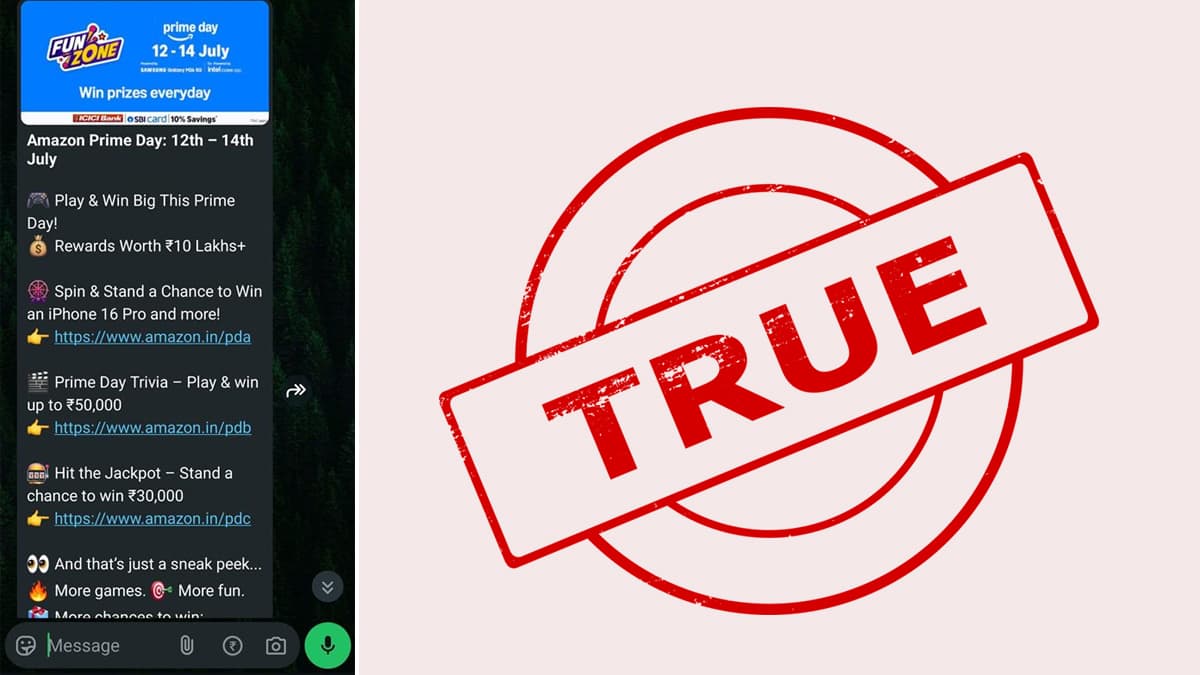Mumbai, June 27: A message going viral on WhatsApp and social media is claiming that Amazon India is offering customers rewards and chances to win prizes every day during Amazon Prime Day. As per the WhatsApp message, the Amazon Prime Day will take place from July 12 to 14. During this period, Amazon has brought an interactive Fun Zone that will offer participants opportunities to win an iPhone 16 Pro, cash prizes, and much more. However, people are curious to know if the message is true and whether Amazon is indeed holding a Prime Day with the “win prizes everyday” offer. Scroll below to know the truth. The news about Amazon India offering customers a chance to win prizes every day is true. Amazon confirmed the Prime Day event by sending an official message on its WhatsApp channel. As per the post shared by Amazon, Prime Day will be held from for two days from July 12 to 14. During this period, Amazon will be offering its customers an opportunity to win multiple prizes every day. So what are the prizes? Customers who will take part in the games on Amazon’s Fun Zone during Prime Day will stand a chance to win an iPhone 16 Pro by spinning the wheel and a cash prize of INR 50,000 by taking part in the Prime Day Trivia game. Is Shubhanshu Shukla on X? Fake Twitter Account Impersonating Indian Astronaut Appears as He Leads NASA Axiom Mission 4 to ISS. How To Identify Spam Links in Messages Still doubtful whether Amazon’s message on WhatsApp is genuine or false? Scroll down to learn how to verify whether a hyperlink or web address in messages received on WhatsApp is genuine or fake. It’s important to be vigilant when it comes to hyperlinks and web addresses in WhatsApp messages, as scammers often use them to spread malware, steal personal information (phishing), or trick you into unwanted actions. Here’s a comprehensive guide to help you verify their authenticity: 1. Scrutinise the Link (Don’t Click Immediately!) Hover or Press and Hold: On a computer, hover your mouse cursor over the link without clicking. On the other hand, press and hold the link (don’t tap) on a mobile device. This should reveal the full URL in a pop-up or at the bottom of your screen. Check the Domain Name: This is the most important part to know if the WhatsApp message is fake or genuine Legitimate vs Fake: A genuine link for Amazon will have “amazon.com” (or .in, .co.uk, etc.) as the core domain. A fake one might be “amazon-gift.xyz” or “amaz0n.com” (with a zero instead of an ‘o’). Scammers often use slight misspellings or add extra words to try and fool you. Look for the “Top-Level Domain” (TLD): This is the part after the last dot (e.g., .com, .org, .net, .in). Be wary of unusual TLDs if the message is claiming to be from a well-known company (e.g., a bank using a .biz or .info domain). Subdomains: Be cautious of multiple subdomains that try to mimic a legitimate site. For example, “https://www.google.com/search?q=amazon.gifts.offer.scamdomain.com” is likely fake, even if “amazon” is present. The actual domain is “scamdomain.com”. HTTPS (Padlock Icon): Look for “https://” at the beginning of the URL. The “s” stands for “secure” and indicates an encrypted connection. While not a guarantee of legitimacy (scammers can also get HTTPS certificates), its absence for a reputable site is a major red flag. URL Shorteners: Be very cautious of shortened URLs (like bit.ly, tinyurl.com). These hide the true destination. If you’re suspicious, you can use online URL expanders (like unshorten.it or checkshorturl.com) to reveal the full link before deciding to click. Nationwide Holiday in India on 7 July 2025 for Muharram? 7th July Public Holiday Not Yet Officially Declared, Check if Stock Markets, Banks, Schools and Colleges Remain Open or Closed. 2. Evaluate the Message Content Sense of Urgency/Threats: Scammers often try to create panic (“Your account will be suspended if you don’t click now!”) or offer “too good to be true” deals (“You’ve won a lottery! Click here to claim!”). These are classic phishing tactics. Spelling and Grammar Errors: Legitimate companies and organisations usually have professional communications. Numerous typos, grammatical mistakes, or awkward phrasing are strong indicators of a scam. Requests for Personal Information: Be extremely wary if a link or message asks for sensitive information like passwords, bank account details, credit card numbers, or your WhatsApp verification code. No legitimate company or WhatsApp itself will ask for this via a link in a message. Unusual Offers or Prizes: If it sounds too good to be true, it probably is. Free iPhones, huge cash prizes, or exclusive discounts that require you to click a link are almost always scams. Generic Greetings: If a message from a supposed company addresses you generically (“Dear Customer”) instead of by name, it’s a red flag. Did ICE Deport Mads Mikkelsen Over JD Vance Meme? Fact Check Reveals Why Norwegian Tourist Was Really Sent Back From US. 3. Verify the Sender Unknown Number: Exercise extreme caution if the message comes from a number not in your contacts. WhatsApp often provides signals for unknown senders, indicating if you have groups in common or if the number is from a different country. Known Contact, but Suspicious Message: Their account might have been compromised even if the message is from a friend or family member. If the message seems out of character or contains unusual links, contact them through a different method (a phone call or a separate message not on WhatsApp) to verify if they actually sent it. WhatsApp Verified Business Accounts: Some legitimate businesses have a green tick badge next to their name on WhatsApp. This indicates that WhatsApp has verified their authenticity. However, the absence of a green tick doesn’t automatically mean a business is fake, as many smaller businesses may not have it.
